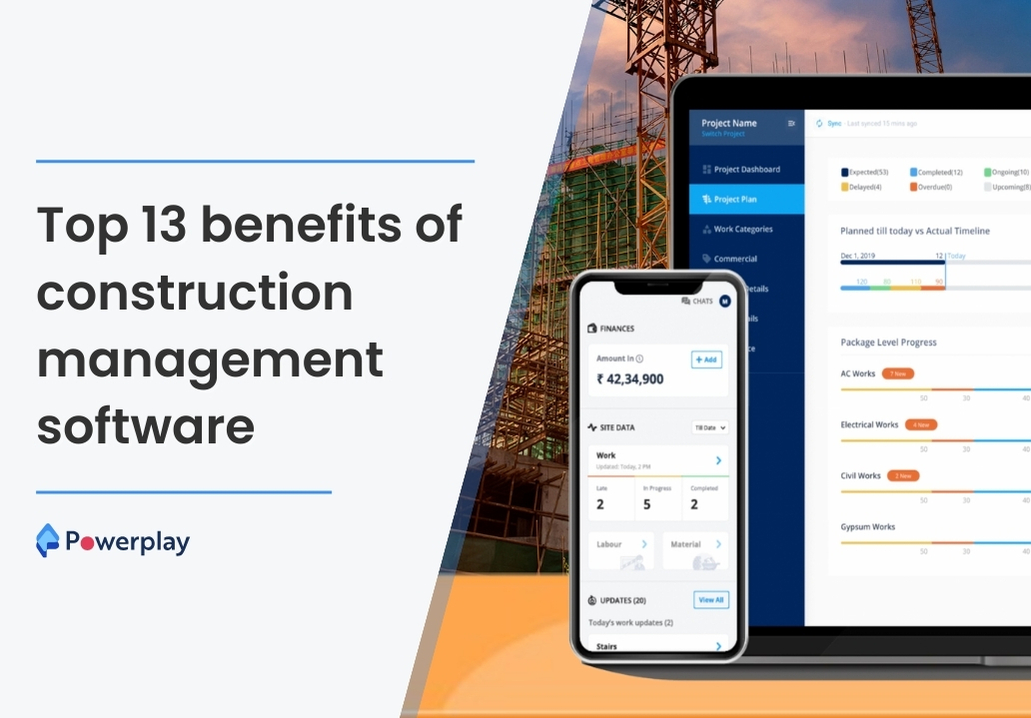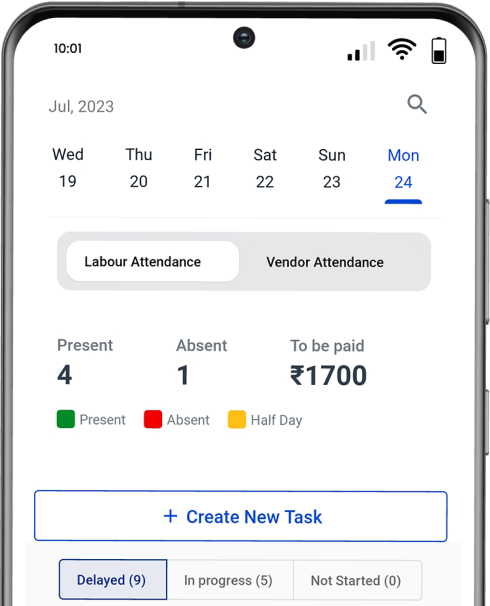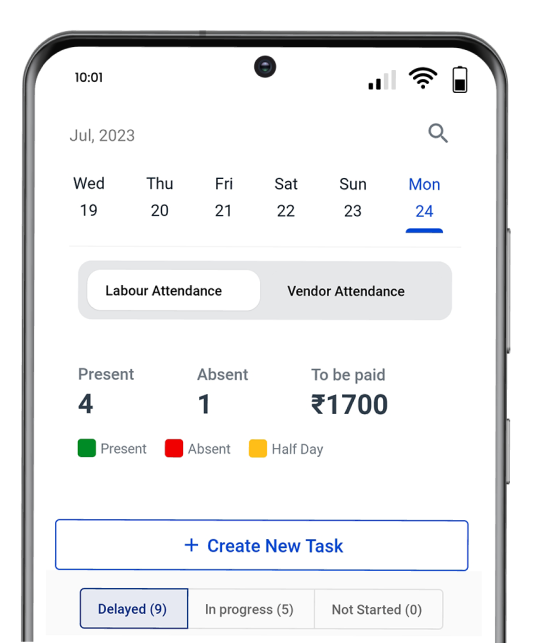What Is a General Contractor In Construction?
-
 Sapna
Sapna
- June 30, 2024

The General Contractor (GC) is pivotal in bringing building projects to life. From initial planning to completion, GCs oversee and manage every aspect of the construction process.
They coordinate with various subcontractors, procure materials, and ensure adherence to building codes and local regulations. As the primary liaison between the property owner, construction managers, architects, and engineers, GCs are essential in maintaining project schedules and budgets. Their expertise and leadership ensure that construction projects meet the desired specifications and are completed efficiently and safely.
Table of Contents
What Is a General Contractor?
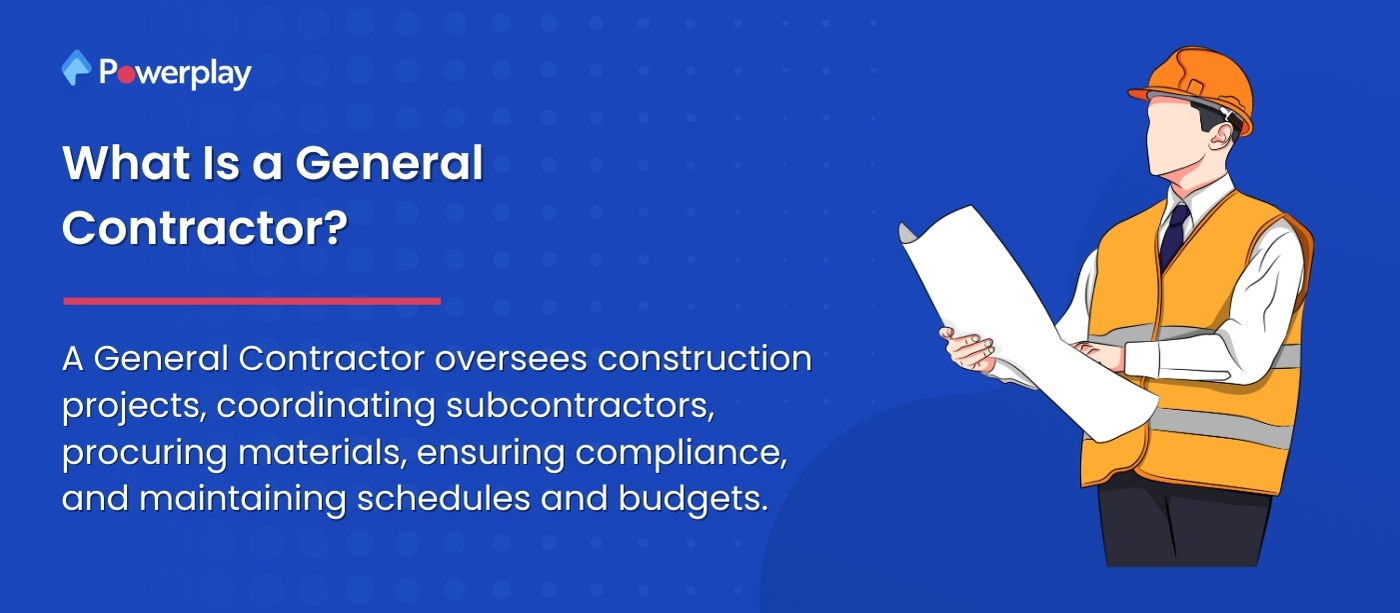
A General Contractor (GC) is a professional who oversees and manages construction projects. They coordinate and supervise the work of subcontractors, procure materials, ensure compliance with building codes and regulations, and maintain project schedules and budgets.
GCs handle tasks from project planning to completion, including hiring labour and building, purchasing materials, obtaining permits, and ensuring safety standards. They act as the primary point of contact for clients, architects, and engineers, ensuring that the project meets the desired specifications and is completed on time and within budget.
What Is a General Contractor License?
A General Contractor License is a legal authorisation required for individuals or businesses to operate as general contractors. This license ensures that the contractor has met specific qualifications, including education, experience, and passing relevant exams.
It typically involves proving competency in construction practices, safety regulations liability insurance, and business operations. The licensing process varies by state or country and may include background checks and financial stability assessments. Holding a general contractor license ensures construction companies’ adherence to local building codes and standards, offering protection to clients and maintaining industry integrity.
What Does a General Contractor Do?
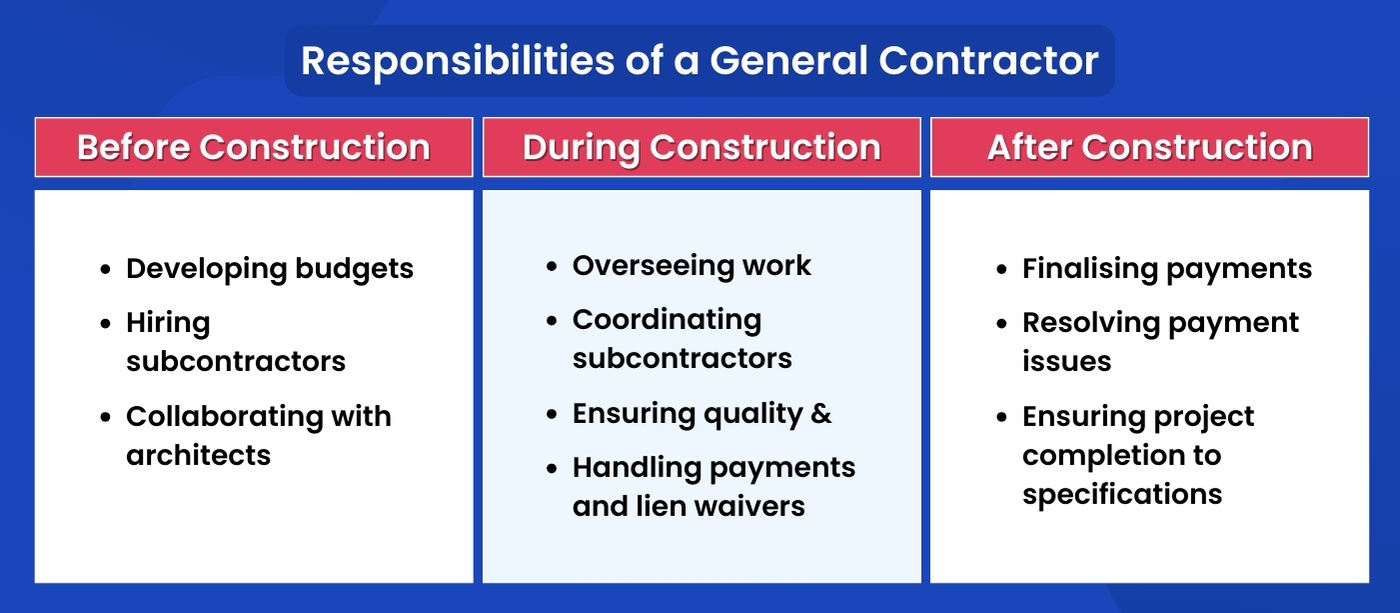
A General Contractor (GC) manages and oversees construction projects from start to finish. Their responsibilities include hiring and supervising subcontractors, procuring materials, obtaining necessary permits, and ensuring compliance with building codes and safety regulations. They create and maintain project schedules, manage budgets, and address any issues that arise during construction.
General Contractors act as the licensed general contractor and serves primary point of contact for clients, architects, and engineers, ensuring that the project meets specifications and is completed on time and within budget. They coordinate all aspects of the construction process to ensure successful project delivery.
General contractors have responsibilities before, after and during the construction professional project management, important responsibilities which include:
Responsibilities Before Construction:
- Developing budgets
- Hiring subcontractors
- Collaborating with architects
Responsibilities During Construction:
- Overseeing work and maintaining schedules
- Coordinating subcontractors
- Ensuring quality and managing inspections
- Handling payments and lien waivers
Responsibilities After Construction:
- Finalising payments
- Resolving payment issues
- Ensuring project completion to specifications
General contractor responsibilities
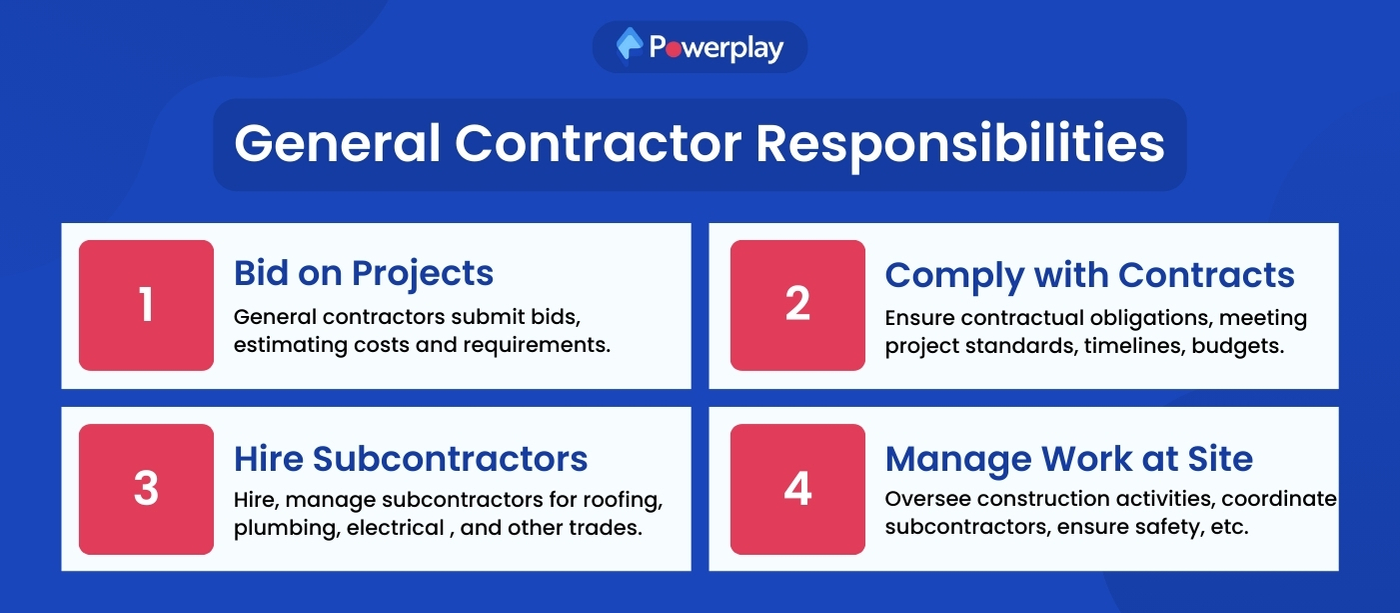
General Contractor Responsibilities
1. Bid on Projects
General contractors (GCs) prepare and submit bids for various construction projects here. This involves estimating labour, materials, equipment, and time costs and understanding project specifications and requirements. GCs must analyse the scope of work and propose competitive yet realistic bids to win contracts.
2. Comply with Contracts, General Conditions & General Requirements
GCs are responsible for adhering to all contractual obligations, which include the terms outlined in the contract, general conditions, and specific project requirements. This ensures that the whole project plan is executed according to agreed-upon standards, timelines, and budgets and that all legal and regulatory guidelines are followed.
3. Hire Construction Subcontractors
GCs hire and manage subcontractors to perform specialised electrical work, plumbing, roofing, and other trades. They ensure that they hire subcontractors who are qualified, negotiate contracts, and coordinate their work to align with the overall project schedule and quality standards.
4. Manage Construction Work at the Job Site
GCs oversee all on-site construction activities, ensuring that the work progresses smoothly and meets quality standards. They coordinate the work of subcontractors, address any issues or delays, and ensure that safety protocols are strictly followed on the construction site. GCs also handle inspections, manage resources, and maintain clear communication with all stakeholders involved to keep the project on track.
Types of General Contractors
Commercial General Contractor
A Commercial General Contractor specialises in constructing, renovating, and remodelling commercial properties such as office buildings, retail stores, warehouses, and industrial facilities. They manage large-scale projects that often involve complex logistical and regulatory requirements. Responsibilities include:
- Project Planning: Developing detailed project plans and timelines.
- Regulatory Compliance: Ensuring adherence to local building codes, zoning laws, and safety regulations.
- Subcontractor Management: Coordinating with specialised subcontractors for electrical work, HVAC installation, and plumbing.
- Material Procurement: Securing high-quality materials that meet commercial standards.
- Client Communication: Acting as the main point of contact for clients, architects, and engineers.
- Quality Control: Maintaining high standards of workmanship and ensuring all aspects of the project meet specified quality criteria.
Residential General Contractor
A Residential General Contractor focuses on constructing, renovating, and remodelling residential properties such as single-family homes, apartments, and townhouses. They handle smaller-scale projects than commercial contractors but require a deep understanding of residential and commercial construction practices. Responsibilities include:
- Project Management: Overseeing the entire construction process from initial planning to completion.
- Permitting and Inspections: Obtaining necessary building permits and scheduling inspections to ensure compliance with local building codes.
- Subcontractor Coordination: Hiring and supervising subcontractors for specific tasks such as framing, roofing, plumbing, and electrical work.
- Budget Management: Estimating costs and managing the project budget to avoid overruns.
- Client Interaction: Working closely with homeowners to understand their needs and preferences, providing regular updates, and ensuring client satisfaction.
- Quality Assurance: Ensuring all work is completed to a high standard and meets client expectations.
General Contractor Salary
The average salary for a general contractor in India varies based on experience and location. Entry-level general contractors can expect to earn around ₹320,000 per year, while more experienced professionals can make up to ₹2,000,000 annually. The overall average salary is approximately ₹840,000 per year.
Contractor or Construction Estimate Template
A Contractor Estimate Template, or a construction estimate template, is a standardised document that contractors use to provide detailed cost estimates for construction projects. It typically includes sections for labour, materials, equipment, and other project-related expenses, ensuring all potential costs are accounted for. This template helps contractors present a clear and professional breakdown of anticipated client costs, facilitating transparency and trust.
Benefits of Hiring a General Contractor
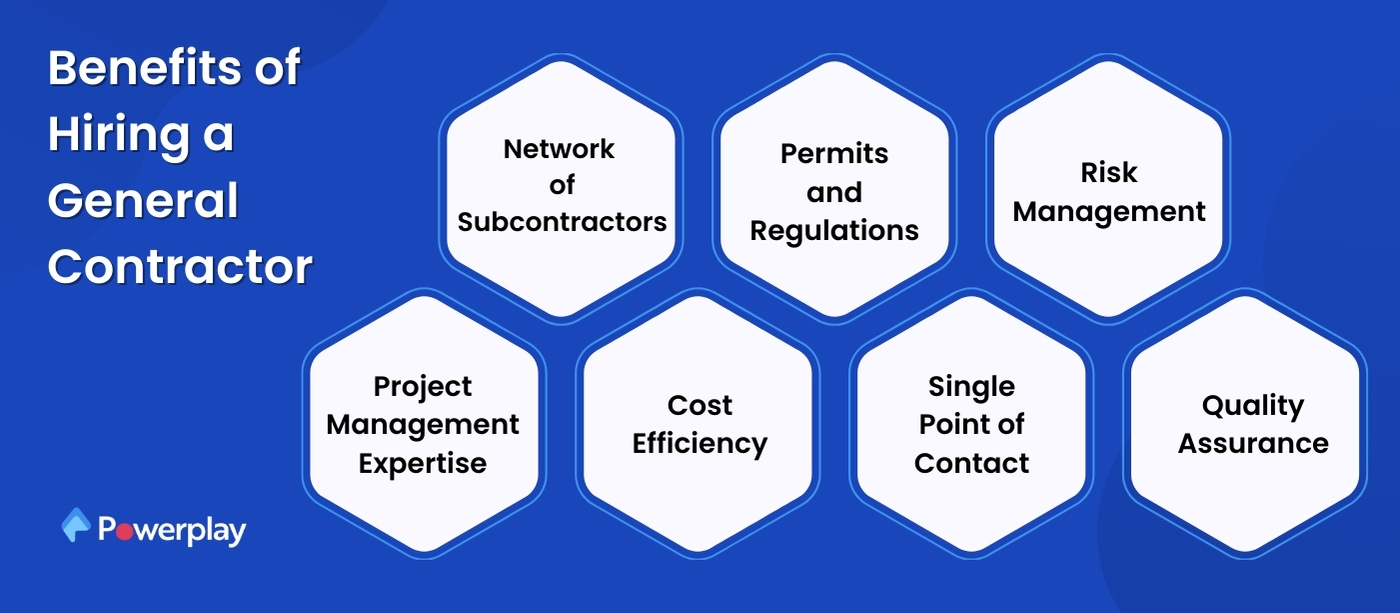
Hiring licensed general contractors and contractors can offer various benefits to parties involved in your construction project, such as:
- Project Management Expertise: General contractors (GCs) bring extensive experience managing construction projects, ensuring they are completed on time and within budget.
- Network of Subcontractors: GCs have established relationships with reliable subcontractors, ensuring high-quality work and timely completion.
- Permits and Regulations: They handle all necessary permits and ensure compliance with local building codes and regulations.
- Risk Management: GCs manage potential risks and issues that may arise during construction, providing solutions and maintaining project stability.
- Cost Efficiency: With their industry knowledge, GCs can procure materials at better prices and prevent costly mistakes, ultimately saving the client money.
- Single Point of Contact: Clients have a single point of contact for all project-related communication, simplifying coordination and reducing stress.
- Quality Assurance: GCs ensure all work meets the highest quality and safety standards.
A general contractor’s role in the payment process
A general contractor (GC) plays a crucial role in the payment process by managing financial transactions between clients and subcontractors. They prepare detailed invoices for the client, outlining labour, materials, and other expenses. GCs ensure subcontractors and material suppliers are paid according to the agreed schedule, often based on project milestones. They track all payments, maintain accurate financial records, and handle payment disputes. Additionally, GCs manage lien waivers to protect the client from potential claims and ensure the smooth financial progression of the project.
Differentiating between construction contractors
While General Contractor in construction oversee the overall construction process, they are not the only key players on job sites, especially for large-scale projects. Here are some important roles to know:
General Contractor / Prime Contractor
The General Contractor (GC) or Prime Contractor holds the main contract with the owner. While the GC often acts as the prime contractor, some project delivery methods assign non-GCs as prime contractors. The prime contractor is often responsible for overseeing the overall bidding process and project coordination, ensuring all tasks are completed according to contract specifications.
Construction Manager
A construction manager (CM) is directly employed by the project owner and has responsibilities similar to those of a GC. They estimate costs, hire GCs, and perform various project management duties. Unlike GCs, CMs are involved from the planning phase, providing expertise and oversight throughout the project lifecycle.
Specialty Contractor
Speciality contractors are hired by the General Contractor in construction to perform specific, specialised tasks such as electrical work, plumbing, or masonry. They bring specialised skills and expertise to the building project, ensuring quality and compliance with specific aspects of the construction. Speciality contractors are paid by the GC, making them integral to the project’s execution.
General Contractor vs. Construction Manager
| Aspect | General Contractor (GC) | Construction Manager (CM) |
| Employment | Typically, an independent entity hired by the owner | Often directly employed by the owner |
| Project Involvement | Engages primarily in the construction phase | Involved from the planning phase through to completion |
| Responsibilities | Manages subcontractors, procurement, and on-site activities | Estimates cost, hires GCs, oversees the entire project |
| Payment Structure | Paid through the project budget, often in instalments | Typically, on a fixed fee or hourly basis |
| Decision-Making | Handles day-to-day construction decisions | Provides strategic oversight and decision-making guidance |
How Powerplay Is the Perfect Tool for General Contractors
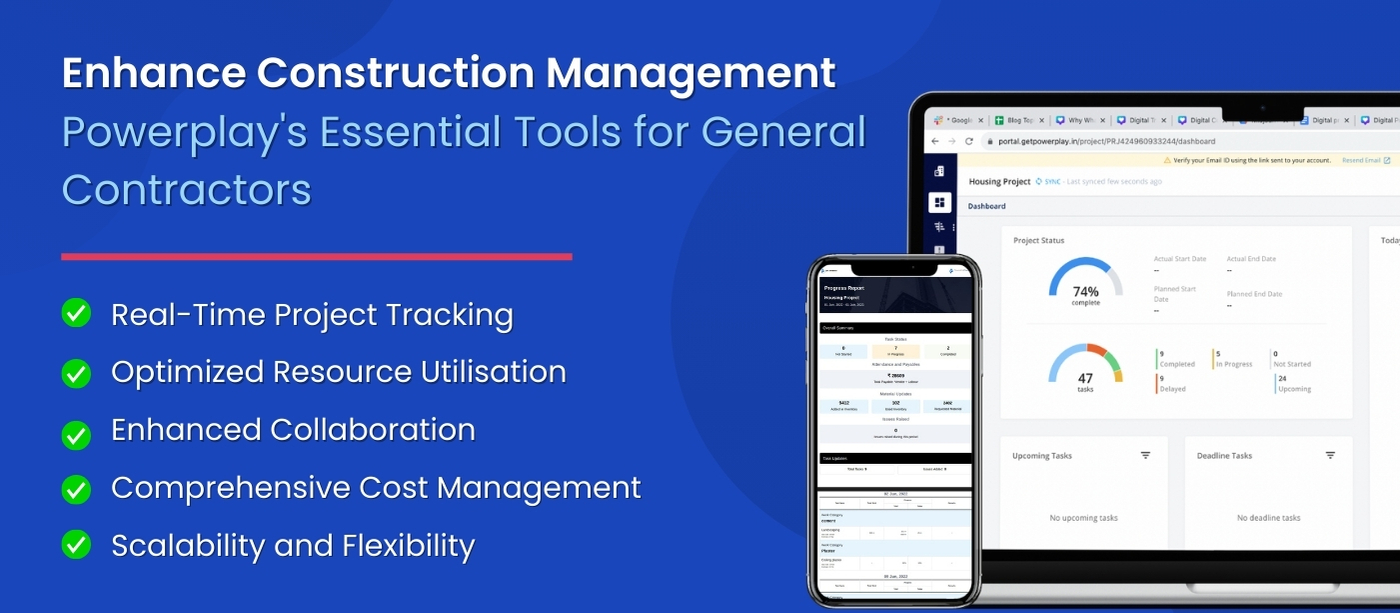
Powerplay offers a comprehensive suite of features tailored to the needs of general contractors, making it an essential tool for managing construction projects effectively. Here are the key benefits:
1. Real-Time Project Tracking
Powerplay provides immediate visibility into project status, allowing GCs to monitor project progress, resource allocation, and timelines in real time. This helps in proactive decision-making and addressing issues promptly to avoid delays and cost overruns.
2. Optimized Resource Utilisation
With tools for workforce scheduling, equipment tracking, and material management, Powerplay ensures efficient use of resources. This minimises downtime and maximises productivity, leading to improved project performance and cost savings.
3. Enhanced Collaboration and Communication
Powerplay facilitates seamless communication among all project stakeholders through real-time messaging, notifications, and collaborative project dashboards. This ensures that everyone involved in the construction is informed and aligned, enhancing teamwork and project execution.
4. Comprehensive Cost Management
The platform offers robust budgeting and cost-tracking features, enabling GCs to monitor expenses, track budget variances, and forecast financials accurately. This helps maintain financial control and optimise project profitability.
5. Scalability and Flexibility
Powerplay is scalable, accommodating projects of various sizes and complexities. It grows with your business, providing the flexibility needed to handle multiple projects simultaneously and adapt to changing business needs.
Share

Sapna is a versatile content writer with two years of experience crafting engaging content across various platforms, including blogs, websites, social media, and newsletters. She specialises in the real estate and construction industry, creating compelling narratives that resonate with diverse audiences and enhance brand visibility and engagement.



